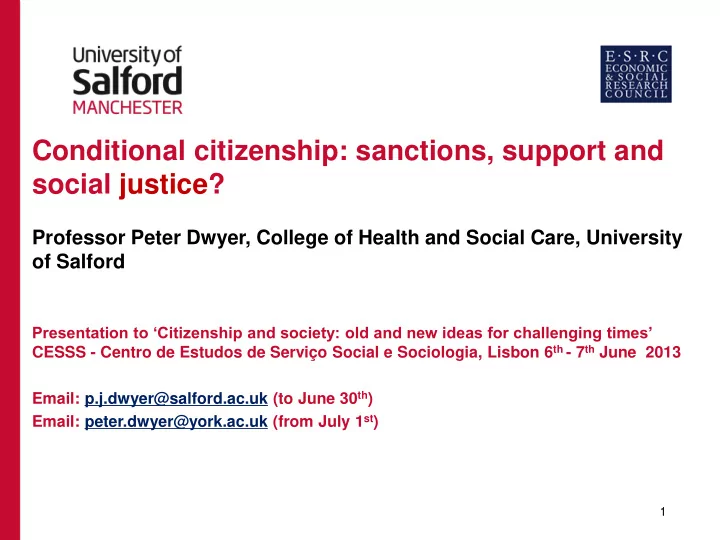

Conditional citizenship: sanctions, support and social justice? Professor Peter Dwyer, College of Health and Social Care, University of Salford Presentation to ‘Citizenship and society: old and new ideas for challenging times’ CESSS - Centro de Estudos de Serviço Social e Sociologia, Lisbon 6 th - 7 th June 2013 Email: p.j.dwyer@salford.ac.uk (to June 30 th ) Email: peter.dwyer@york.ac.uk (from July 1 st ) 1
Introduction Citizenship and social justice Contested concepts subject to debate and change Towards conditional entitlement/citizenship The intensification and extension of conditionality Sanctions, support and behaviour change: understanding the role and impact of welfare conditionality A five year ESRC (UK) funded study Conclusion: constrained citizenship 2
Social justice and citizenship: competing visions Social justice The justice of the market (Nozick, 1974,1995) Justice beyond the market (Rawls, 1971) Capabilities and justice (Sen,1992, 2010) Citizenship Liberalism Citizenship as a status, rights and entitlements passively enjoyed Civic Republicanism/Communitarianism Citizenship as an office, a responsibility, a burden proudly assumed (Walzer, 1989) 3
Conditional entitlement/citizenship An ongoing shift from welfare rights to conditional entitlement Social Liberal/Social Democratic PWWS: access to extensive unconditional (?) package of welfare rights a substantive part of citizenship status Emergence of a new conditionality consensus: social citizenship is being reconfigured influenced by New Right and New Communitarian critics Aspects of conditionality Principle of Conditionality (Deacon, 1994) Realigning the relationship between entitlement/support and conduct/behaviour (Handler, 2004) Use of sanctions and support (‘sticks and carrots’) to change behaviour ‘Amorphous’ – ‘concrete’ conditionality (Paz -Fuchs, 2008) Social exclusion/reducing the welfare rights of poor people (Dwyer, 1998). 4
The extension and intensification of conditionality: the UK example New Labour (1997-2010) Social security: various ‘New Deals’ (from 1997), Welfare Reform and Pensions Act (1999), Welfare Reform Acts (2007, 2009), Jobcentre Plus (2002), Freud Report (2007), Employment and Support Allowance (2008) Management of anti social behaviour: The Crime and Disorder Act (1998) Anti-Social Behaviour Act (2003), Criminal Justice Act (2003), Action Plan on Social Exclusion (2006), Respect Action Plan (RTF, 2006) Education and healthcare: Sure Start Maternity Grant (2001), Welfare Food Scheme (2002), The Skills for Life Scheme (2001) The Conservative/Liberal Coalition (2010 -?) Enthusiastic endorsement of ESA: use of WCA to reclassify many disabled people as fit for work Mandatory Work Activity (May 2011): for JSA claimants with poor work records/ethic The Work Programme (June 2011) The Welfare Reform Act (2012): Introduction of Universal Credit, intensified, personalised and extended conditionality applied to in work benefit recipients for the first time 5
Sanctions, support and behaviour change: understanding the role and impact of welfare conditionality Five year project 2013-2018 Six universities in England and Scotland Explore conditionality across a range of policy domains Recipients of social security benefits (unemployed people, lone mothers, disabled people), homeless people, social tenants, individuals/families subject to antisocial behaviour orders/family intervention projects, offenders and migrants. Funded by the ESRC under grant ref: ES/K002163/1 6
Sanctions, support and behaviour change: understanding the role and impact of welfare conditionality Twin aims To consider the ethics and efficacy of welfare conditionality Methods Initial mapping of theoretical and normative frameworks, literature review, secondary data analysis, consultation workshops, expert panel seminars undertake Fieldwork with three sets of respondents 1. Semi-structured interviews with 40 'elite' policymakers/actors 2. 24 focus groups (6-10 respondents) with frontline welfare practitioners who implement policy 3. Three rounds of repeat qualitative longitudinal interviews with a diverse sample of 400 welfare recipients who are subject to conditionality i.e. 1200 interviews in total. Fieldwork will be undertaken in a variety of locations in England and Scotland. 7
Conclusions: whither social citizenship? Conditionality: a significant reformulation of the rights and responsibilities of social citizenship A focus on individual behaviour: marginalises social, economic and political causes of unemployment, poverty and social issues Citizenship in challenging times: the return of the economic imperative Conditionality offers an appealing mix of the financial and behavioural: in the age of austerity ‘money and morals’ (Dwyer 2000) serve as a smokescreen to undermine the welfare state This is not a eulogy to T.H. Marshall: institutionally situated social rights are essential for effective social citizenship A diminished vision of social citizenship/social justice in the future ???? 8
Recommend
More recommend